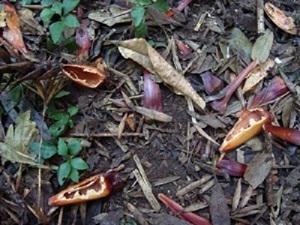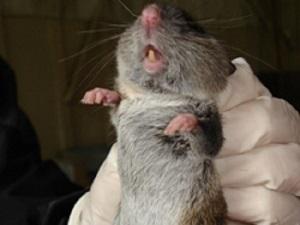Jayme Prevedello
The project aims to determine the impacts of harvesting the seeds of Araucaria angustifolia on mammals of the Atlantic Forest.

Seeds of Araucaria angustifolia eaten by mammals.
Some plant resources in forest ecosystems are considered “keystone resources” because they sustain a large portion of the vertebrate community. A potential keystone species in the Atlantic Forest is the Brazilian Pine (Araucaria angustifolia), whose seeds are produced massively in the winter, period of overall scarcity of resources, feeding several species of birds and mammals. The massive harvest of those seeds for human consumption and trade is common in southern Brazil, but its ecological consequences are still unknown.

The rodent Delomys dorsalis, the most abundant small mammal in the study area
This study combines different methods with the general aim of determining the impacts of harvesting the seeds of Araucaria angustifolia on mammals of the Atlantic Forest. The effects on individuals, populations, and communities of small, medium and large mammals will be studied to understand how the structure and functioning of mammal communities are affected by this activity. Eight 2ha areas of Araucaria Forest with similar vegetation structure will be monitored for two years, four controls (with seeds) and four removal areas (without seeds). Seeds fallen on the ground will be collected by local people along all the four 2ha sites, and the other four sites will not be used by collectors serving as controls. Live-traps will be used to sample small mammals, and camera traps to sample medium and large mammals. Timing devices will be used to investigate how seed availability affects activity patterns of small mammals. Spool-and-line tracking devices will be used to determine the effects of seed removal on the movement of individuals.
It is predicted that seed removal will reduce body mass of individuals, population density, and the diversity of mammal communities, resulting in loss of biodiversity in its different levels. The results will be used to develop tools and strategies to manage the harvesting of A. angustifolia seeds, making mammal conservation compatible with benefits to local people.